外研版(2019)必修第一册Unit 2 Exploring English-Starting out & Understanding ideas课件(48张ppt)
文档属性
| 名称 | 外研版(2019)必修第一册Unit 2 Exploring English-Starting out & Understanding ideas课件(48张ppt) | 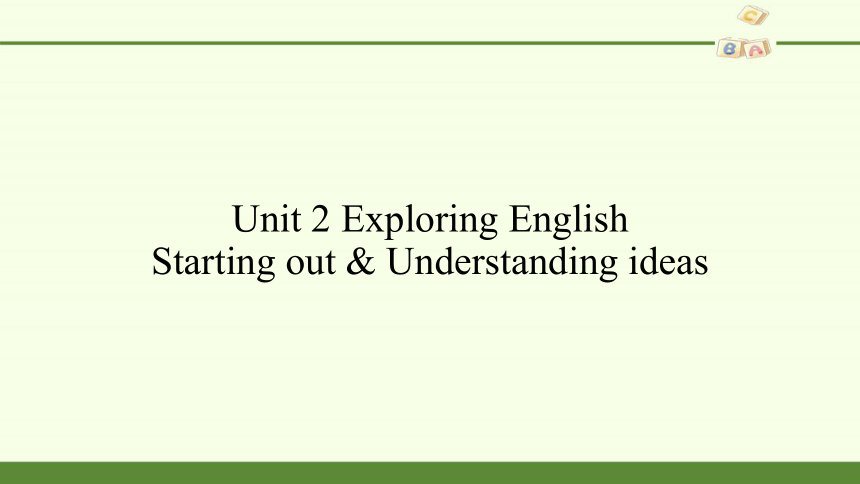 | |
| 格式 | pptx | ||
| 文件大小 | 2.2MB | ||
| 资源类型 | 教案 | ||
| 版本资源 | 外研版(2019) | ||
| 科目 | 英语 | ||
| 更新时间 | 2021-09-14 13:09:56 | ||
图片预览

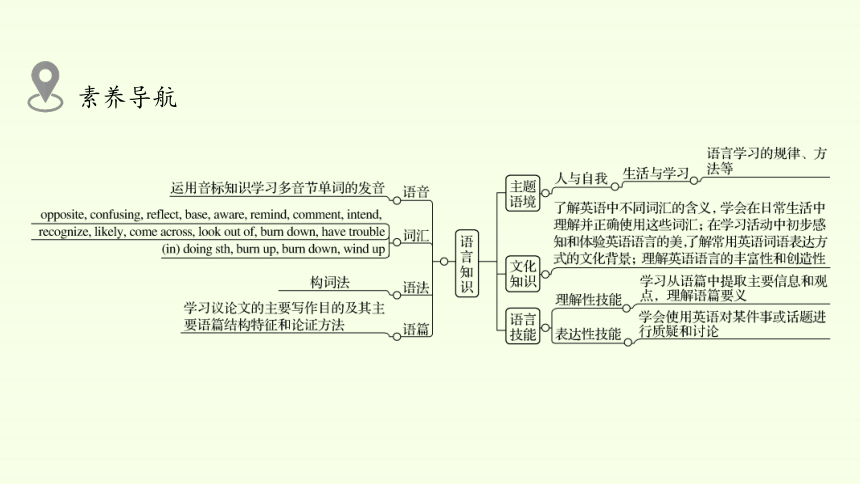

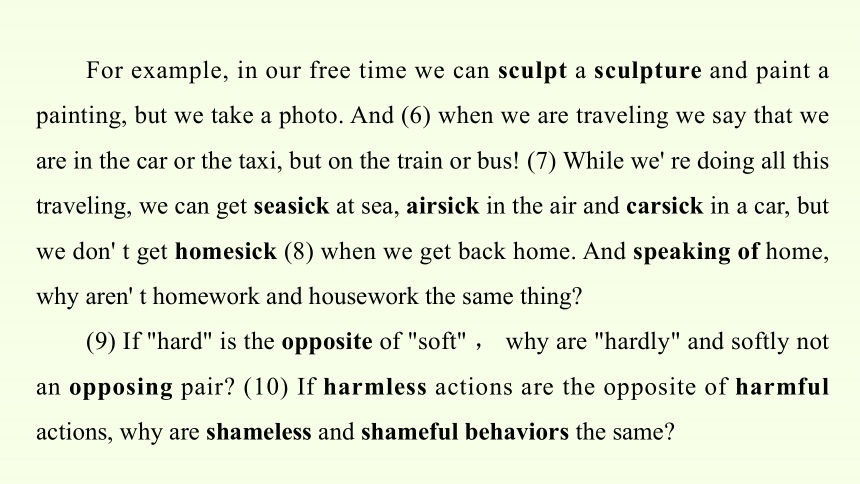
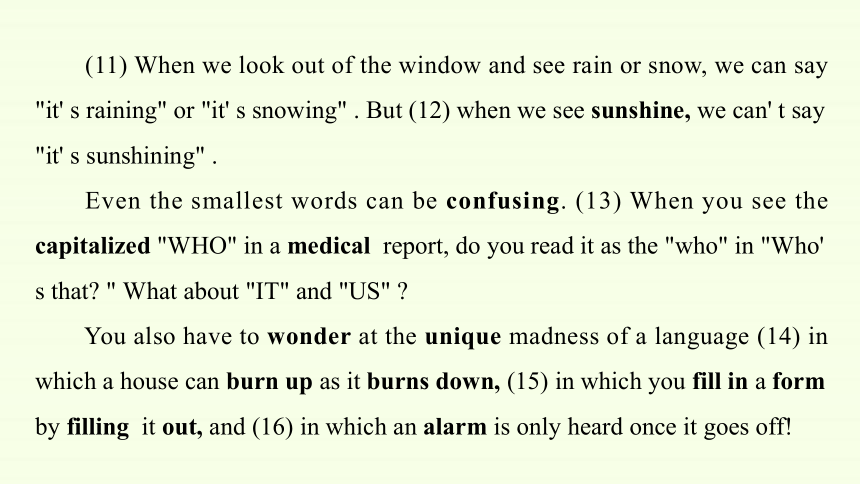
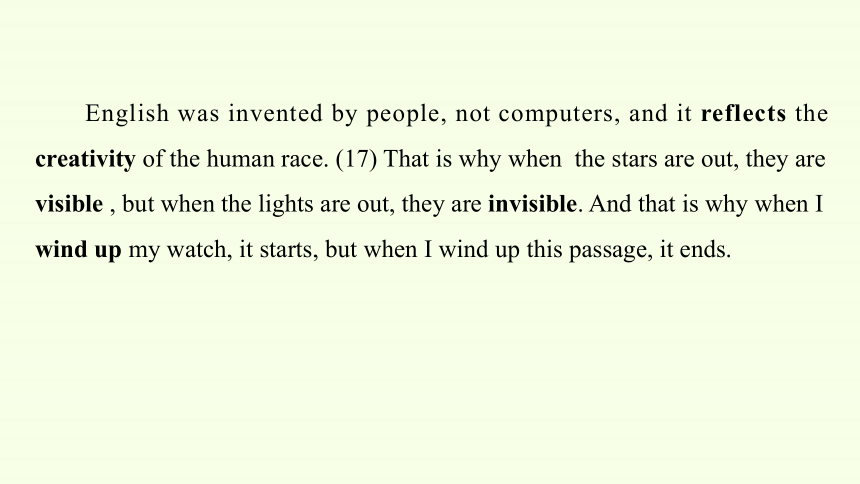
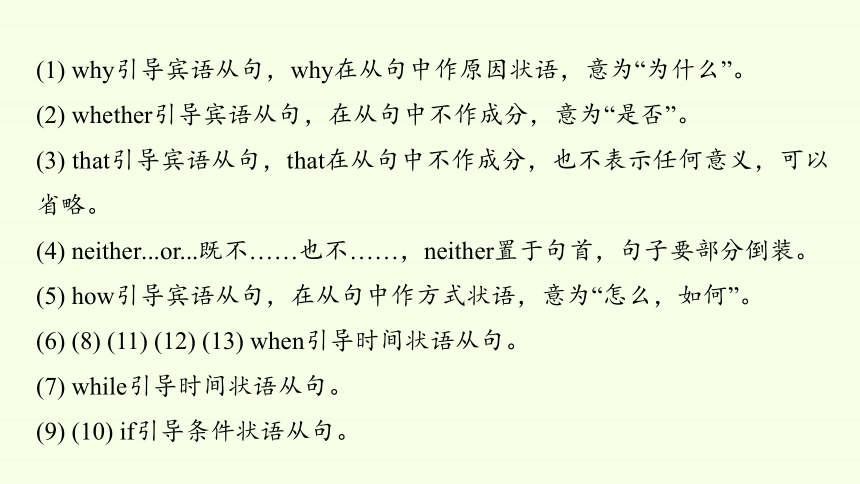
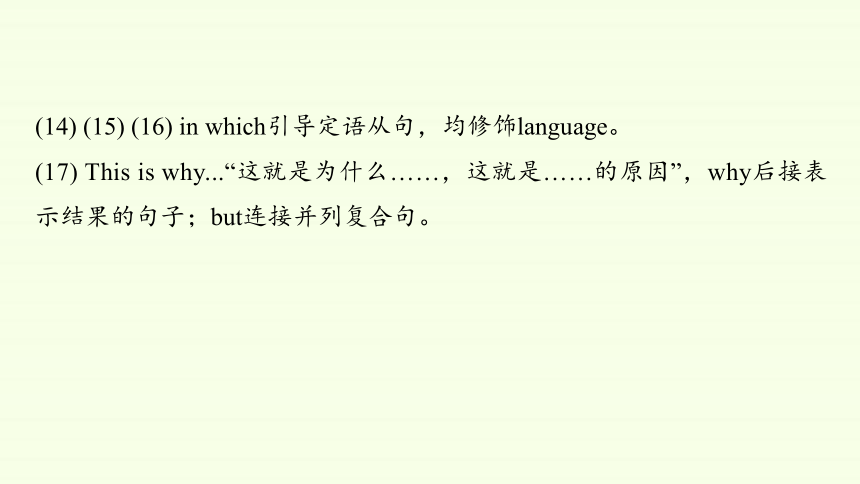
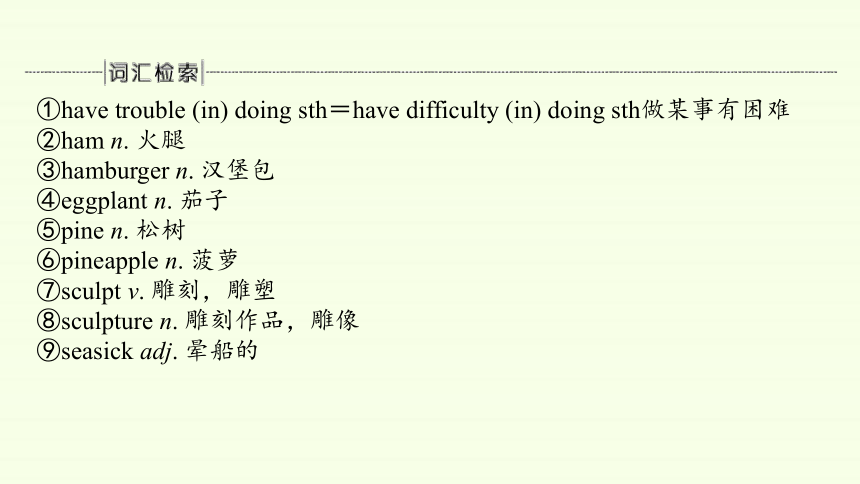
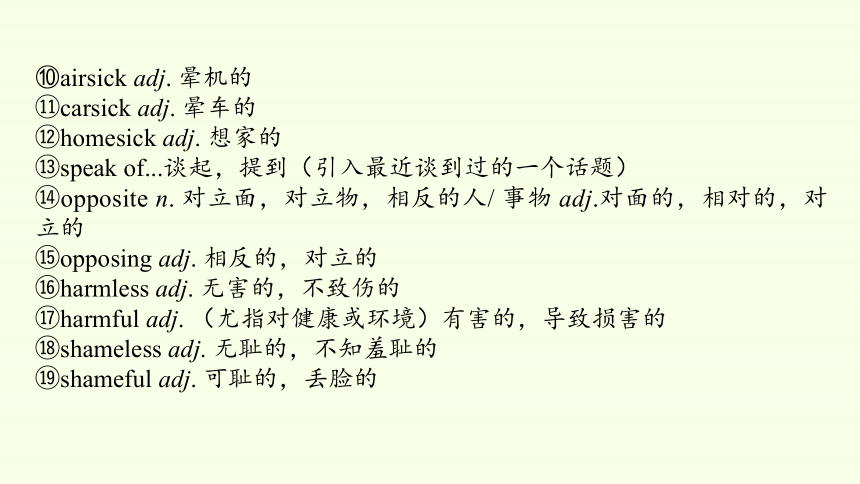
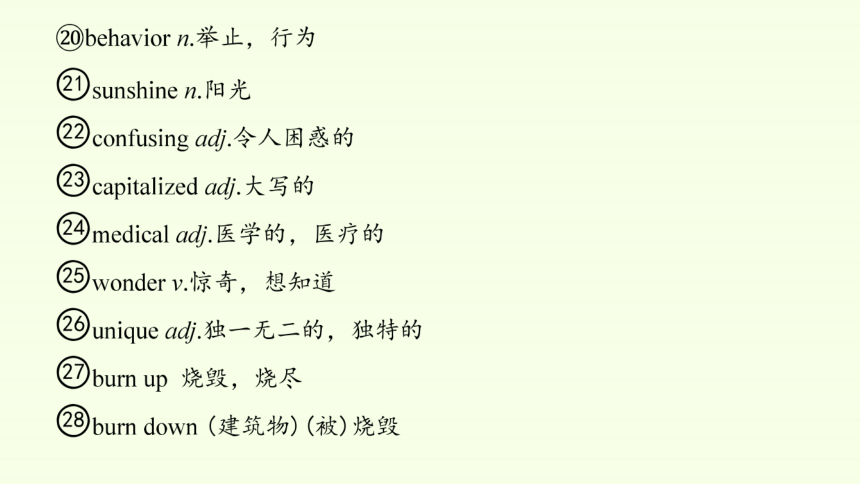
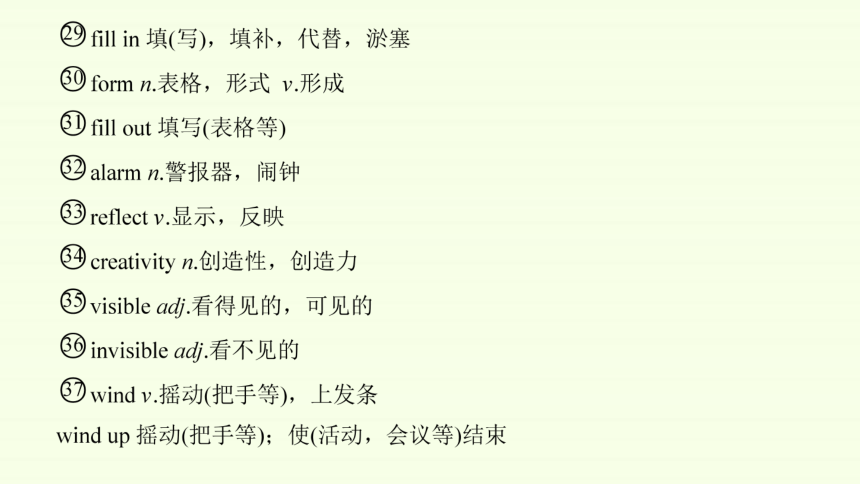
文档简介
(共48张PPT)
Unit
2
Exploring
English
Starting
out
&
Understanding
ideas
素养导航
Neither
Pine
nor
Apple
in
Pineapple
Have
you
ever
asked
yourself
(1)
why
people
often
have
trouble
learning
English?
I
hadn'
t,
until
one
day
my
five-year-old
son
asked
me
(2)
whether
there
was
ham
in
a
hamburger.
There
isn'
t.
This
made
me
realize
(3)
that
there'
s
no
egg
in
eggplant
either.
(4)
Neither
is
there
pine
nor
apple
in
pineapple.
This
got
me
thinking
(5)
how
English
can
be
a
crazy
language
to
learn.
For
example,
in
our
free
time
we
can
sculpt
a
sculpture
and
paint
a
painting,
but
we
take
a
photo.
And
(6)
when
we
are
traveling
we
say
that
we
are
in
the
car
or
the
taxi,
but
on
the
train
or
bus!
(7)
While
we'
re
doing
all
this
traveling,
we
can
get
seasick
at
sea,
airsick
in
the
air
and
carsick
in
a
car,
but
we
don'
t
get
homesick
(8)
when
we
get
back
home.
And
speaking
of
home,
why
aren'
t
homework
and
housework
the
same
thing?
(9)
If
"hard"
is
the
opposite
of
"soft"
,
why
are
"hardly"
and
softly
not
an
opposing
pair?
(10)
If
harmless
actions
are
the
opposite
of
harmful
actions,
why
are
shameless
and
shameful
behaviors
the
same?
(11)
When
we
look
out
of
the
window
and
see
rain
or
snow,
we
can
say
"it'
s
raining"
or
"it'
s
snowing"
.
But
(12)
when
we
see
sunshine,
we
can'
t
say
"it'
s
sunshining"
.
Even
the
smallest
words
can
be
confusing.
(13)
When
you
see
the
capitalized
"WHO"
in
a
medical
report,
do
you
read
it
as
the
"who"
in
"Who'
s
that?
"
What
about
"IT"
and
"US"
?
You
also
have
to
wonder
at
the
unique
madness
of
a
language
(14)
in
which
a
house
can
burn
up
as
it
burns
down,
(15)
in
which
you
fill
in
a
form
by
filling
it
out,
and
(16)
in
which
an
alarm
is
only
heard
once
it
goes
off!
English
was
invented
by
people,
not
computers,
and
it
reflects
the
creativity
of
the
human
race.
(17)
That
is
why
when
the
stars
are
out,
they
are
visible
,
but
when
the
lights
are
out,
they
are
invisible.
And
that
is
why
when
I
wind
up
my
watch,
it
starts,
but
when
I
wind
up
this
passage,
it
ends.
(1)
why引导宾语从句,why在从句中作原因状语,意为“为什么”。
(2)
whether引导宾语从句,在从句中不作成分,意为“是否”。
(3)
that引导宾语从句,that在从句中不作成分,也不表示任何意义,可以省略。
(4)
neither...or...既不……也不……,neither置于句首,句子要部分倒装。
(5)
how引导宾语从句,在从句中作方式状语,意为“怎么,如何”。
(6)
(8)
(11)
(12)
(13)
when引导时间状语从句。
(7)
while引导时间状语从句。
(9)
(10)
if引导条件状语从句。
(14)
(15)
(16)
in
which引导定语从句,均修饰language。
(17)
This
is
why...“这就是为什么……,这就是……的原因”,why后接表示结果的句子;but连接并列复合句。
①have
trouble
(in)
doing
sth=have
difficulty
(in)
doing
sth做某事有困难
②ham
n.
火腿
③hamburger
n.
汉堡包
④eggplant
n.
茄子
⑤pine
n.
松树
⑥pineapple
n.
菠萝
⑦sculpt
v.
雕刻,雕塑
⑧sculpture
n.
雕刻作品,雕像
⑨seasick
adj.
晕船的
⑩airsick
adj.
晕机的
?carsick
adj.
晕车的
?homesick
adj.
想家的
?speak
of...谈起,提到(引入最近谈到过的一个话题)
?opposite
n.
对立面,对立物,相反的人/
事物
adj.对面的,相对的,对立的
?opposing
adj.
相反的,对立的
?harmless
adj.
无害的,不致伤的
?harmful
adj.
(尤指对健康或环境)有害的,导致损害的
?shameless
adj.
无耻的,不知羞耻的
?shameful
adj.
可耻的,丢脸的
Step
Ⅰ
General
reading
Match
each
part
with
its
main
idea.
Para.
1
A.
Give
some
examples
to
discuss
the
topic.
Paras.
2~6
B.
Conclude
the
topic
of
the
text.
Paras.
7~8
C.
Lead
to
the
topic
of
the
text.
答案 Para.
1—C Paras.
2~6—A Paras.
7~8—B
Step
Ⅱ
Factual
reading
Read
the
text
carefully
and
choose
the
best
answer.
1.
What
is
the
structure
of
the
text?
2.
How
does/
the
author
support
his/
her
idea
in
the
text?
A.
By
listing
numbers.
B.
By
making
comparison.
C.
By
giving
some
examples.
D.
By
using
some
research
results.
3.What
is
the
author'
s
purpose
in
writing
the
text?
A.
To
explain
how
English
was
created.
B.
To
give
advice
on
how
to
learn
English.
C.
To
tell
us
that
English
is
very
difficult
to
learn.
D.
To
show
that
English
is
interesting
and
creative.
4.
Which
of
the
following
statements
is
NOT
true
according
to
the
text?
A.
When
we
see
rain,
we
can
say
it'
s
raining.
B.
When
we
see
the
capitalized
"WHO"
in
a
medical
report,
we
can
read
it
as
the
"who"
in
"Who'
s
that?
".
C.
Harmless
actions
are
the
opposite
of
harmful
actions.
D.
We
can
see
the
stars
when
they
are
out.
5.
What
do
the
two
phrases
wind
up
mean
in
the
last
sentence?
A.
They
both
mean
"turn
a
handle"
.
B.
They
both
mean
"finish
or
stop
doing
sth"
.
C.
The
first
means
"turn
a
handle",
the
second
means
"finish
or
stop
doing
sth"
.
D.
The
first
means
"finish
or
stop
doing
sth"
,
the
second
means
"turn
a
handle"
.
答案 1.
D 2.
C 3.
D 4.
B 5.
C
Step
Ⅲ
Cloze
test
Fill
in
the
blanks
according
to
the
text.
Have
you
ever
asked
1.
____________
(you)
why
people
often
have
trouble
2.
____________
(learn)
English?
I
hadn'
t,
until
one
day
my
five-year-old
son
asked
me
3.
____________
there
was
ham
in
a
hamburger
or
not.
This
got
me
thinking
how
English
can
be
a
crazy
language
4.
____________
(learn)
.
Even
the
smallest
of
words
can
be
5.
____________
(confuse)
.
You
also
have
to
wonder
at
the
unique
madness
of
a
language
in
6.
____________
a
house
can
burn
up
as
it
burns
down,
and
in
which
an
alarm
7.
____________
(hear)
once
it
goes
off!
yourself
learning
whether
to
learn
confusing
which
is
heard
English
8.
____________
(invent)
by
people,
not
computers,
and
it
reflects
the
creativity
of
the
human
race.
That
is
why
when
the
stars
are
out,
they
are
visible,
but
when
the
9.
____________
(light)
are
out,
they
are
invisible.
And
that
is
why
when
I
wind
up
my
watch,
it
starts,
10.
____________
when
I
wind
up
this
passage,
it
ends.
was
invented
lights
but
Ⅰ.
词汇语境认知
1.
Water
is
the
opposing
force
to
fire.
_______________
2.
The
students
began
to
feel
homesick
after
they
had
been
away
from
home
for
only
a
month.
____________
3.
You
will
likely
feel
seasick
on
your
first
trip
at
sea.
____________
4.
Each
of
us
is
unique
and
we
have
come
down
to
the
world
to
develop
our
own
beautiful
gifts.
____________
——写出语境中加黑单词或短语的意义
相反的,对立的
想家的
晕船的
独一无二的
5.
I
normally
wake
up
about
five
minutes
after
my
alarm
clock
goes
off.
____________
6.
I
hate
travelling
by
air
because
I
get
horribly
airsick.
____________
7.
The
title
of
the
book
should
be
interesting
and
attractive.
____________
闹钟
晕机的
题目,标题
Ⅱ.
单词语境记忆
1.
I
like
the
jobs
which
are
challenging
and
____________
(create)
.
2.
Many
stars
overhead
are
____________
(看不见的)
to
the
naked
eye.
3.
Her
____________
(behave)
at
the
party
was
completely
out
of
character.
4.
On
seeing
this
wonderful
____________
(sculpt)
,
everyone
present
let
out
a
cry
of
surprise.
5.
Your
facial
expression
can
____________
(反映)
your
real
feelings.
6.
His
writing
is
so
____________
(confuse)
that
it
is
difficult
to
make
out
what
she
wants
to
express.
7.
The
first
letter
in
a
sentence
should
be
____________
(大写的)
.
——根据英汉提示写出单词的适当形式
creative
invisible
behavior
sculpture
reflect
confusing
capitalized
Ⅲ.
短语语境填空
1.
________________
(在我的空余时间)
,
I
like
surfing
online
and
listen
to
music.
2.
________________
(当谈到)
money,
it'
s
important
but
it'
s
not
everything.
3.
If
you
walk
home,
your
body
will
________________
(消耗)
about
100
calories
of
energy.
4.
I
can
________________
(向……外看)
the
kitchen
window
while
doing
the
dishes
and
see
the
flowers.
5.
The
speaker
will
soon
________________
(结束)
his
speech.
6.
They
gave
us
each
student
a
form
to
________________
(填写)
.
——根据汉语提示写出适当的短语
In
my
free
time
Speaking
of
burn
up
look
out
of
wind
up
fill
in
1.
opposite
adj.
相反的,相对的,对立的,对面的n.
对立面,对立物prep.
在……对面/对过adv.
在对面,在对过
·If
“hard”
is
the
opposite
of
“soft”,
why
are
“hardly”
and
“softly”
not
an
opposing
pair?
(教材P15)如果hard(坚硬的)是soft(柔软的)的反义词,为什么hardly(几乎不)和softly(柔软地)不是一对反义词呢?
?写出下列句中opposite的词性及词义
①She
tried
calming
him
down
but
it
seemed
to
be
having
the
opposite
effect.
____________
②Hot
and
cold
are
opposites.
__________________
③I
sat
opposite
him
during
the
meal.
____________________
④There'
s
a
newly
married
couple
living
opposite.
____________
·My
father
is
a
very
calm
person,
but
my
mother
is
just
the
opposite.
我的父亲是一个非常镇静的人,而我的母亲恰恰相反。
adj.
相反的
n.
对立面,对立物
prep.
在……对面/对过
adv.
在对面
?补全句子
⑤The
result
_________________
what
we
had
expected.
结果和我们所期望的大为相反。
⑥Mary
is
very
generous,
but
her
sister
is
__________________.
玛丽很慷慨,可她妹妹却正好相反。
was
opposite
to
just
the
opposite
用法总结
be
opposite
to
在……对面;与……相反
just
the
opposite
恰恰相反
词块积累
the
opposite
sex
异性
the
opposite
meaning
相反的意思
in
the
opposite
direction
在相反的方向
2.
confusing
adj.
令人困惑的,难以理解的
·Even
the
smallest
words
can
be
confusing.(教材P15)
即使是最小的单词也会令人困惑。
·I
think
it'
s
a
serious
mistake
to
confuse
work
with
life.
我认为把工作同生活混为一谈是大错特错。
·I
love
learning
new
words,
but
I
am
confused
about
how
to
remember
them
well.
我喜欢学习新单词,但是我对如何记忆单词感到困惑不解。
·He
looked
at
me
in
confusion
and
did
not
answer
the
question.
他困惑地看着我并没有回答这个问题。
?介词填空
①You
should
not
confuse
your
career
____________
your
life.
②I
am
still
a
bit
confused
____________
what
happened.
?用confuse的适当形式填空
They
③____________
me
by
asking
so
many
④______________
questions.I
was
totally
⑤____________,
standing
there
in
⑥____________,
not
knowing
what
to
do.
with
about
confused
confusing
confused
confusion
单词一族
confuse
vt.
使迷惑,混淆
confused
adj.
困惑的
confusion
n.
混乱,困惑
用法总结
confuse...with/
and...
把……和……混淆
be
confused
about
sth
对某事迷惑不解
in
confusion
困惑地,混乱地
3.
reflect
vt.
反映;反射(声、光、热等);显示;表达;沉思
·English
was
invented
by
people,
not
computers,
and
it
reflects
the
creativity
of
the
human
race.(教材P15)
英语是人而不是电脑发明的,它反映了人类的创造力。
?写出下列句中reflect的含义
①Her
facial
expression
reflected
how
she
really
felt.
____________
②Our
newspaper
aims
to
reflect
the
views
of
the
local
community.
____________
③Before
I
decide,
I
need
time
to
reflect.
____________
反映
表达
沉思
·The
manager
needed
more
time
to
reflect
on/
upon
what
to
do.
经理需要更多的时间来思考做什么。
·On
reflection,
we
decided
to
change
our
plan.
经考虑后,我们决定改变计划。
?单句语法填空/补全句子
④His
face
____________
(reflect)
in
the
big
mirror
when
he
passed
by.
⑤Your
clothes
are
often
a
____________
(reflect)
of
your
personality.
⑥On
dark
nights
children
should
wear
____________
(reflect)
clothing.
⑦At
first
I
thought
it
was
a
bad
idea,
but
________________
I
realized
she
was
right.
最初我认为那是个坏主意,但经再三思考,我认识到她是对的。
was
reflected
reflection
reflective
on
reflection
单词一族
reflection
n. 反映;映像;沉思,深思
reflective
adj.
(指人、心情等)深思熟虑的;(指物体表面)反光的
?用法总结
reflect
on/
upon
sth
认真思考……
on/
upon
reflection
经再三思考
1.
have
trouble
(in)
doing
sth做某事有困难
·Have
you
ever
asked
yourself
why
people
often
have
trouble
learning
English?
(教材P14)
你有没有问过自己为什么人们在学习英语时经常遇到困难?
?单句语法填空/补全句子
①I
never
have
trouble
in
____________
(sleep)
in
a
strange
place.
②Whenever
we
have
trouble
____________
our
studies,
our
teachers
always
help
us
patiently.
③I
________________________________________________
foreigners.
我与外国人交流有困难。
sleeping
with
have
trouble/
difficulty/
problems
in
communicating
with
短语记牢
(1)
have
trouble/
difficulty/
problems
(in)
doing
sth做某事有困难/麻烦
(2)
have
trouble/
difficulty/
problems
with
sth在某方面有麻烦或有困难
2.
look
out
of从……往外看
·When
we
look
out
of
the
window
and
see
rain
or
snow,
we
can
say
“it'
s
raining”
or
“it'
s
snowing”
.(教材P15)当我们看到窗外下雨或下雪时,我们可以说it'
s
raining(正在下雨)或it'
s
snowing(正在下雪)。
?用look相关短语的适当形式填空
①If
you
________________
the
window
on
the
left
of
the
bus,
you'
ll
see
that
we'
re
now
approaching
the
Tower
of
London.
②When
I
________________
those
days,
I
was
very
sad.
look
out
of
looked
back
at
③We
shouldn'
t
__________________
the
disabled;on
the
contrary,
we
should
help
them.
④It
is
reported
that
the
police
will
soon
________________
the
case
of
two
missing
children.
⑤I
________________
today'
s
newspaper
but
I
found
nothing
important.
look
down
upon/
on
look
into
looked
through
短语记牢
look
out 当心(不及物动词短语)
look
out
for
当心,注意(及物动词短语)
look
back
at/
on
回忆,回顾
look
down
on/
upon
看不起,轻视
look
into
调查
look
through
翻阅,查找
look
up
to
尊敬
3.
burn
down烧毁,烧掉(多指建筑物被烧塌)
·You
also
have
to
wonder
at
the
unique
madness
of
a
language
in
which
a
house
can
burn
up
as
it
burns
down...(教材P15)
你也不得不对一种语言的独特疯狂感到惊奇。在这种语言中,房子可以在burns
down(被烧毁)时burn
up(烧毁)……
?补全句子
①A
number
of
houses
____________________
in
the
fire.
在火灾中,有许多房子被烧毁了。
②Brisk
walking
______________
more
calories
than
slow
jogging.
快走比慢跑能消耗更多的热量。
were
burnt
down
burns
up
③The
fire
_______________
before
the
fire
engines
arrived.
在消防车到达之前,火已经熄灭了。
④At
least
nine
houses
_______________________________
in
the
big
fire
last
week.
在上周的这场大火中,至少九座房子被烧为平地。
had
burnt
out
were
burned
to
the
ground
短语记牢
burn
up 烧光,烧尽(多指东西被烧掉);(通过锻炼)消耗(热能)
burn
out
烧坏;燃尽;耗尽体力
burn
sth
to
the
ground
将……烧成平地
1.
Neither
is
there
pine
nor
apple
in
pineapple.(教材P14)菠萝中既没有松树也没有苹果。
【分析】
本句中neither...nor...意为“既不……也不……”,其含义是否定的,可连接任意两个并列的成分。
【总结】
neither...nor...的用法:
(1)
neither...nor...连接两个主语时,谓语动词的单复数应和临近的主语一致,遵循“就近原则”。
(2)
neither可以单独作主语,表示“两者中没有一个”。
(3)
表示“一个人没有做某事,另一个人也没做同一类事”时,可用neither或nor引起的部分倒装句进行简略回答,其结构为:Neither/
Nor+助动词/
情态动词/
be动词+主语。
·Neither
dad
nor
mum
is
at
home
today.
今天父母都不在家。
·Neither
of
them
likes
football.
他们俩都不喜欢足球。
·They
didn'
t
go
to
the
park
yesterday.
Neither/
Nor
did
we.
昨天他们没去公园,我们也没去。
单句语法填空
①Neither
his
parents
nor
he
____________
(like)
eating
meat.
补全句子
②—I
have
never
been
to
New
York
yet.
—____________________(我也没去过)
.
句型转换
③The
parents
were
not
satisfied
with
the
result
and
their
son
wasn'
t
either.
→________
________
________
________
________
________
________
satisfied
with
the
result.
likes
Neither/
Nor
have
I
Neither
the
parents
nor
their
son
was
2.
That
is
why
when
the
stars
are
out,
they
are
visible,
but
when
the
lights
are
out,
they
are
invisible.(教材P15)
这就是为什么星星出来时是看得见的,灯灭了是看不见的。
【分析】
本句中That
is
why...意为“这就是……的原因”;why引导表语从句,表示结果;That指代上文提到的事实。
【拓展】
其他相关句型:
(1)
This/
That
is/
was
why...这/那就是……的原因(why引导表语从句,表示结果)
(2)
That/
It
is/
was
because...这/那是因为……(because引导表语从句,表示原因)
(3)
The
reason
why...is/
was
that...……的原因是……(why引导定语从句并在从句中做状语;that引导表语从句,表示原因)
He
fell
off
a
tall
tree.
That
was
why
he
hurt
his
leg.
=He
hurt
his
leg.
That
was
because
he
fell
off
a
tall
tree.
=The
reason
why
he
hurt
his
leg
was
that
he
fell
off
a
tall
tree.
他从一棵很高的树上摔下来。那就是他弄伤腿的原因。
单句语法填空
①He'
s
more
of
a
talker
than
a
doer.
This
is
____________
he
never
finishes
anything.
②From
space,
the
earth
looks
blue.
This
is
____________
about
seventy-one
percent
of
its
surface
is
covered
by
water.
句型转换
③Tom
came
late
for
the
meeting
because
he
was
ill.
→
Tom
was
ill.
________
________
________
he
came
late
for
the
meeting.
→Tom
came
late
for
the
meeting.
________
________
________
he
was
ill.
→________
________
________
Tom
came
late
for
the
meeting
________
________
he
was
ill.
why
because
That
was
why
That
was
because
The
reason
why
was
that
Thank
you
Unit
2
Exploring
English
Starting
out
&
Understanding
ideas
素养导航
Neither
Pine
nor
Apple
in
Pineapple
Have
you
ever
asked
yourself
(1)
why
people
often
have
trouble
learning
English?
I
hadn'
t,
until
one
day
my
five-year-old
son
asked
me
(2)
whether
there
was
ham
in
a
hamburger.
There
isn'
t.
This
made
me
realize
(3)
that
there'
s
no
egg
in
eggplant
either.
(4)
Neither
is
there
pine
nor
apple
in
pineapple.
This
got
me
thinking
(5)
how
English
can
be
a
crazy
language
to
learn.
For
example,
in
our
free
time
we
can
sculpt
a
sculpture
and
paint
a
painting,
but
we
take
a
photo.
And
(6)
when
we
are
traveling
we
say
that
we
are
in
the
car
or
the
taxi,
but
on
the
train
or
bus!
(7)
While
we'
re
doing
all
this
traveling,
we
can
get
seasick
at
sea,
airsick
in
the
air
and
carsick
in
a
car,
but
we
don'
t
get
homesick
(8)
when
we
get
back
home.
And
speaking
of
home,
why
aren'
t
homework
and
housework
the
same
thing?
(9)
If
"hard"
is
the
opposite
of
"soft"
,
why
are
"hardly"
and
softly
not
an
opposing
pair?
(10)
If
harmless
actions
are
the
opposite
of
harmful
actions,
why
are
shameless
and
shameful
behaviors
the
same?
(11)
When
we
look
out
of
the
window
and
see
rain
or
snow,
we
can
say
"it'
s
raining"
or
"it'
s
snowing"
.
But
(12)
when
we
see
sunshine,
we
can'
t
say
"it'
s
sunshining"
.
Even
the
smallest
words
can
be
confusing.
(13)
When
you
see
the
capitalized
"WHO"
in
a
medical
report,
do
you
read
it
as
the
"who"
in
"Who'
s
that?
"
What
about
"IT"
and
"US"
?
You
also
have
to
wonder
at
the
unique
madness
of
a
language
(14)
in
which
a
house
can
burn
up
as
it
burns
down,
(15)
in
which
you
fill
in
a
form
by
filling
it
out,
and
(16)
in
which
an
alarm
is
only
heard
once
it
goes
off!
English
was
invented
by
people,
not
computers,
and
it
reflects
the
creativity
of
the
human
race.
(17)
That
is
why
when
the
stars
are
out,
they
are
visible
,
but
when
the
lights
are
out,
they
are
invisible.
And
that
is
why
when
I
wind
up
my
watch,
it
starts,
but
when
I
wind
up
this
passage,
it
ends.
(1)
why引导宾语从句,why在从句中作原因状语,意为“为什么”。
(2)
whether引导宾语从句,在从句中不作成分,意为“是否”。
(3)
that引导宾语从句,that在从句中不作成分,也不表示任何意义,可以省略。
(4)
neither...or...既不……也不……,neither置于句首,句子要部分倒装。
(5)
how引导宾语从句,在从句中作方式状语,意为“怎么,如何”。
(6)
(8)
(11)
(12)
(13)
when引导时间状语从句。
(7)
while引导时间状语从句。
(9)
(10)
if引导条件状语从句。
(14)
(15)
(16)
in
which引导定语从句,均修饰language。
(17)
This
is
why...“这就是为什么……,这就是……的原因”,why后接表示结果的句子;but连接并列复合句。
①have
trouble
(in)
doing
sth=have
difficulty
(in)
doing
sth做某事有困难
②ham
n.
火腿
③hamburger
n.
汉堡包
④eggplant
n.
茄子
⑤pine
n.
松树
⑥pineapple
n.
菠萝
⑦sculpt
v.
雕刻,雕塑
⑧sculpture
n.
雕刻作品,雕像
⑨seasick
adj.
晕船的
⑩airsick
adj.
晕机的
?carsick
adj.
晕车的
?homesick
adj.
想家的
?speak
of...谈起,提到(引入最近谈到过的一个话题)
?opposite
n.
对立面,对立物,相反的人/
事物
adj.对面的,相对的,对立的
?opposing
adj.
相反的,对立的
?harmless
adj.
无害的,不致伤的
?harmful
adj.
(尤指对健康或环境)有害的,导致损害的
?shameless
adj.
无耻的,不知羞耻的
?shameful
adj.
可耻的,丢脸的
Step
Ⅰ
General
reading
Match
each
part
with
its
main
idea.
Para.
1
A.
Give
some
examples
to
discuss
the
topic.
Paras.
2~6
B.
Conclude
the
topic
of
the
text.
Paras.
7~8
C.
Lead
to
the
topic
of
the
text.
答案 Para.
1—C Paras.
2~6—A Paras.
7~8—B
Step
Ⅱ
Factual
reading
Read
the
text
carefully
and
choose
the
best
answer.
1.
What
is
the
structure
of
the
text?
2.
How
does/
the
author
support
his/
her
idea
in
the
text?
A.
By
listing
numbers.
B.
By
making
comparison.
C.
By
giving
some
examples.
D.
By
using
some
research
results.
3.What
is
the
author'
s
purpose
in
writing
the
text?
A.
To
explain
how
English
was
created.
B.
To
give
advice
on
how
to
learn
English.
C.
To
tell
us
that
English
is
very
difficult
to
learn.
D.
To
show
that
English
is
interesting
and
creative.
4.
Which
of
the
following
statements
is
NOT
true
according
to
the
text?
A.
When
we
see
rain,
we
can
say
it'
s
raining.
B.
When
we
see
the
capitalized
"WHO"
in
a
medical
report,
we
can
read
it
as
the
"who"
in
"Who'
s
that?
".
C.
Harmless
actions
are
the
opposite
of
harmful
actions.
D.
We
can
see
the
stars
when
they
are
out.
5.
What
do
the
two
phrases
wind
up
mean
in
the
last
sentence?
A.
They
both
mean
"turn
a
handle"
.
B.
They
both
mean
"finish
or
stop
doing
sth"
.
C.
The
first
means
"turn
a
handle",
the
second
means
"finish
or
stop
doing
sth"
.
D.
The
first
means
"finish
or
stop
doing
sth"
,
the
second
means
"turn
a
handle"
.
答案 1.
D 2.
C 3.
D 4.
B 5.
C
Step
Ⅲ
Cloze
test
Fill
in
the
blanks
according
to
the
text.
Have
you
ever
asked
1.
____________
(you)
why
people
often
have
trouble
2.
____________
(learn)
English?
I
hadn'
t,
until
one
day
my
five-year-old
son
asked
me
3.
____________
there
was
ham
in
a
hamburger
or
not.
This
got
me
thinking
how
English
can
be
a
crazy
language
4.
____________
(learn)
.
Even
the
smallest
of
words
can
be
5.
____________
(confuse)
.
You
also
have
to
wonder
at
the
unique
madness
of
a
language
in
6.
____________
a
house
can
burn
up
as
it
burns
down,
and
in
which
an
alarm
7.
____________
(hear)
once
it
goes
off!
yourself
learning
whether
to
learn
confusing
which
is
heard
English
8.
____________
(invent)
by
people,
not
computers,
and
it
reflects
the
creativity
of
the
human
race.
That
is
why
when
the
stars
are
out,
they
are
visible,
but
when
the
9.
____________
(light)
are
out,
they
are
invisible.
And
that
is
why
when
I
wind
up
my
watch,
it
starts,
10.
____________
when
I
wind
up
this
passage,
it
ends.
was
invented
lights
but
Ⅰ.
词汇语境认知
1.
Water
is
the
opposing
force
to
fire.
_______________
2.
The
students
began
to
feel
homesick
after
they
had
been
away
from
home
for
only
a
month.
____________
3.
You
will
likely
feel
seasick
on
your
first
trip
at
sea.
____________
4.
Each
of
us
is
unique
and
we
have
come
down
to
the
world
to
develop
our
own
beautiful
gifts.
____________
——写出语境中加黑单词或短语的意义
相反的,对立的
想家的
晕船的
独一无二的
5.
I
normally
wake
up
about
five
minutes
after
my
alarm
clock
goes
off.
____________
6.
I
hate
travelling
by
air
because
I
get
horribly
airsick.
____________
7.
The
title
of
the
book
should
be
interesting
and
attractive.
____________
闹钟
晕机的
题目,标题
Ⅱ.
单词语境记忆
1.
I
like
the
jobs
which
are
challenging
and
____________
(create)
.
2.
Many
stars
overhead
are
____________
(看不见的)
to
the
naked
eye.
3.
Her
____________
(behave)
at
the
party
was
completely
out
of
character.
4.
On
seeing
this
wonderful
____________
(sculpt)
,
everyone
present
let
out
a
cry
of
surprise.
5.
Your
facial
expression
can
____________
(反映)
your
real
feelings.
6.
His
writing
is
so
____________
(confuse)
that
it
is
difficult
to
make
out
what
she
wants
to
express.
7.
The
first
letter
in
a
sentence
should
be
____________
(大写的)
.
——根据英汉提示写出单词的适当形式
creative
invisible
behavior
sculpture
reflect
confusing
capitalized
Ⅲ.
短语语境填空
1.
________________
(在我的空余时间)
,
I
like
surfing
online
and
listen
to
music.
2.
________________
(当谈到)
money,
it'
s
important
but
it'
s
not
everything.
3.
If
you
walk
home,
your
body
will
________________
(消耗)
about
100
calories
of
energy.
4.
I
can
________________
(向……外看)
the
kitchen
window
while
doing
the
dishes
and
see
the
flowers.
5.
The
speaker
will
soon
________________
(结束)
his
speech.
6.
They
gave
us
each
student
a
form
to
________________
(填写)
.
——根据汉语提示写出适当的短语
In
my
free
time
Speaking
of
burn
up
look
out
of
wind
up
fill
in
1.
opposite
adj.
相反的,相对的,对立的,对面的n.
对立面,对立物prep.
在……对面/对过adv.
在对面,在对过
·If
“hard”
is
the
opposite
of
“soft”,
why
are
“hardly”
and
“softly”
not
an
opposing
pair?
(教材P15)如果hard(坚硬的)是soft(柔软的)的反义词,为什么hardly(几乎不)和softly(柔软地)不是一对反义词呢?
?写出下列句中opposite的词性及词义
①She
tried
calming
him
down
but
it
seemed
to
be
having
the
opposite
effect.
____________
②Hot
and
cold
are
opposites.
__________________
③I
sat
opposite
him
during
the
meal.
____________________
④There'
s
a
newly
married
couple
living
opposite.
____________
·My
father
is
a
very
calm
person,
but
my
mother
is
just
the
opposite.
我的父亲是一个非常镇静的人,而我的母亲恰恰相反。
adj.
相反的
n.
对立面,对立物
prep.
在……对面/对过
adv.
在对面
?补全句子
⑤The
result
_________________
what
we
had
expected.
结果和我们所期望的大为相反。
⑥Mary
is
very
generous,
but
her
sister
is
__________________.
玛丽很慷慨,可她妹妹却正好相反。
was
opposite
to
just
the
opposite
用法总结
be
opposite
to
在……对面;与……相反
just
the
opposite
恰恰相反
词块积累
the
opposite
sex
异性
the
opposite
meaning
相反的意思
in
the
opposite
direction
在相反的方向
2.
confusing
adj.
令人困惑的,难以理解的
·Even
the
smallest
words
can
be
confusing.(教材P15)
即使是最小的单词也会令人困惑。
·I
think
it'
s
a
serious
mistake
to
confuse
work
with
life.
我认为把工作同生活混为一谈是大错特错。
·I
love
learning
new
words,
but
I
am
confused
about
how
to
remember
them
well.
我喜欢学习新单词,但是我对如何记忆单词感到困惑不解。
·He
looked
at
me
in
confusion
and
did
not
answer
the
question.
他困惑地看着我并没有回答这个问题。
?介词填空
①You
should
not
confuse
your
career
____________
your
life.
②I
am
still
a
bit
confused
____________
what
happened.
?用confuse的适当形式填空
They
③____________
me
by
asking
so
many
④______________
questions.I
was
totally
⑤____________,
standing
there
in
⑥____________,
not
knowing
what
to
do.
with
about
confused
confusing
confused
confusion
单词一族
confuse
vt.
使迷惑,混淆
confused
adj.
困惑的
confusion
n.
混乱,困惑
用法总结
confuse...with/
and...
把……和……混淆
be
confused
about
sth
对某事迷惑不解
in
confusion
困惑地,混乱地
3.
reflect
vt.
反映;反射(声、光、热等);显示;表达;沉思
·English
was
invented
by
people,
not
computers,
and
it
reflects
the
creativity
of
the
human
race.(教材P15)
英语是人而不是电脑发明的,它反映了人类的创造力。
?写出下列句中reflect的含义
①Her
facial
expression
reflected
how
she
really
felt.
____________
②Our
newspaper
aims
to
reflect
the
views
of
the
local
community.
____________
③Before
I
decide,
I
need
time
to
reflect.
____________
反映
表达
沉思
·The
manager
needed
more
time
to
reflect
on/
upon
what
to
do.
经理需要更多的时间来思考做什么。
·On
reflection,
we
decided
to
change
our
plan.
经考虑后,我们决定改变计划。
?单句语法填空/补全句子
④His
face
____________
(reflect)
in
the
big
mirror
when
he
passed
by.
⑤Your
clothes
are
often
a
____________
(reflect)
of
your
personality.
⑥On
dark
nights
children
should
wear
____________
(reflect)
clothing.
⑦At
first
I
thought
it
was
a
bad
idea,
but
________________
I
realized
she
was
right.
最初我认为那是个坏主意,但经再三思考,我认识到她是对的。
was
reflected
reflection
reflective
on
reflection
单词一族
reflection
n. 反映;映像;沉思,深思
reflective
adj.
(指人、心情等)深思熟虑的;(指物体表面)反光的
?用法总结
reflect
on/
upon
sth
认真思考……
on/
upon
reflection
经再三思考
1.
have
trouble
(in)
doing
sth做某事有困难
·Have
you
ever
asked
yourself
why
people
often
have
trouble
learning
English?
(教材P14)
你有没有问过自己为什么人们在学习英语时经常遇到困难?
?单句语法填空/补全句子
①I
never
have
trouble
in
____________
(sleep)
in
a
strange
place.
②Whenever
we
have
trouble
____________
our
studies,
our
teachers
always
help
us
patiently.
③I
________________________________________________
foreigners.
我与外国人交流有困难。
sleeping
with
have
trouble/
difficulty/
problems
in
communicating
with
短语记牢
(1)
have
trouble/
difficulty/
problems
(in)
doing
sth做某事有困难/麻烦
(2)
have
trouble/
difficulty/
problems
with
sth在某方面有麻烦或有困难
2.
look
out
of从……往外看
·When
we
look
out
of
the
window
and
see
rain
or
snow,
we
can
say
“it'
s
raining”
or
“it'
s
snowing”
.(教材P15)当我们看到窗外下雨或下雪时,我们可以说it'
s
raining(正在下雨)或it'
s
snowing(正在下雪)。
?用look相关短语的适当形式填空
①If
you
________________
the
window
on
the
left
of
the
bus,
you'
ll
see
that
we'
re
now
approaching
the
Tower
of
London.
②When
I
________________
those
days,
I
was
very
sad.
look
out
of
looked
back
at
③We
shouldn'
t
__________________
the
disabled;on
the
contrary,
we
should
help
them.
④It
is
reported
that
the
police
will
soon
________________
the
case
of
two
missing
children.
⑤I
________________
today'
s
newspaper
but
I
found
nothing
important.
look
down
upon/
on
look
into
looked
through
短语记牢
look
out 当心(不及物动词短语)
look
out
for
当心,注意(及物动词短语)
look
back
at/
on
回忆,回顾
look
down
on/
upon
看不起,轻视
look
into
调查
look
through
翻阅,查找
look
up
to
尊敬
3.
burn
down烧毁,烧掉(多指建筑物被烧塌)
·You
also
have
to
wonder
at
the
unique
madness
of
a
language
in
which
a
house
can
burn
up
as
it
burns
down...(教材P15)
你也不得不对一种语言的独特疯狂感到惊奇。在这种语言中,房子可以在burns
down(被烧毁)时burn
up(烧毁)……
?补全句子
①A
number
of
houses
____________________
in
the
fire.
在火灾中,有许多房子被烧毁了。
②Brisk
walking
______________
more
calories
than
slow
jogging.
快走比慢跑能消耗更多的热量。
were
burnt
down
burns
up
③The
fire
_______________
before
the
fire
engines
arrived.
在消防车到达之前,火已经熄灭了。
④At
least
nine
houses
_______________________________
in
the
big
fire
last
week.
在上周的这场大火中,至少九座房子被烧为平地。
had
burnt
out
were
burned
to
the
ground
短语记牢
burn
up 烧光,烧尽(多指东西被烧掉);(通过锻炼)消耗(热能)
burn
out
烧坏;燃尽;耗尽体力
burn
sth
to
the
ground
将……烧成平地
1.
Neither
is
there
pine
nor
apple
in
pineapple.(教材P14)菠萝中既没有松树也没有苹果。
【分析】
本句中neither...nor...意为“既不……也不……”,其含义是否定的,可连接任意两个并列的成分。
【总结】
neither...nor...的用法:
(1)
neither...nor...连接两个主语时,谓语动词的单复数应和临近的主语一致,遵循“就近原则”。
(2)
neither可以单独作主语,表示“两者中没有一个”。
(3)
表示“一个人没有做某事,另一个人也没做同一类事”时,可用neither或nor引起的部分倒装句进行简略回答,其结构为:Neither/
Nor+助动词/
情态动词/
be动词+主语。
·Neither
dad
nor
mum
is
at
home
today.
今天父母都不在家。
·Neither
of
them
likes
football.
他们俩都不喜欢足球。
·They
didn'
t
go
to
the
park
yesterday.
Neither/
Nor
did
we.
昨天他们没去公园,我们也没去。
单句语法填空
①Neither
his
parents
nor
he
____________
(like)
eating
meat.
补全句子
②—I
have
never
been
to
New
York
yet.
—____________________(我也没去过)
.
句型转换
③The
parents
were
not
satisfied
with
the
result
and
their
son
wasn'
t
either.
→________
________
________
________
________
________
________
satisfied
with
the
result.
likes
Neither/
Nor
have
I
Neither
the
parents
nor
their
son
was
2.
That
is
why
when
the
stars
are
out,
they
are
visible,
but
when
the
lights
are
out,
they
are
invisible.(教材P15)
这就是为什么星星出来时是看得见的,灯灭了是看不见的。
【分析】
本句中That
is
why...意为“这就是……的原因”;why引导表语从句,表示结果;That指代上文提到的事实。
【拓展】
其他相关句型:
(1)
This/
That
is/
was
why...这/那就是……的原因(why引导表语从句,表示结果)
(2)
That/
It
is/
was
because...这/那是因为……(because引导表语从句,表示原因)
(3)
The
reason
why...is/
was
that...……的原因是……(why引导定语从句并在从句中做状语;that引导表语从句,表示原因)
He
fell
off
a
tall
tree.
That
was
why
he
hurt
his
leg.
=He
hurt
his
leg.
That
was
because
he
fell
off
a
tall
tree.
=The
reason
why
he
hurt
his
leg
was
that
he
fell
off
a
tall
tree.
他从一棵很高的树上摔下来。那就是他弄伤腿的原因。
单句语法填空
①He'
s
more
of
a
talker
than
a
doer.
This
is
____________
he
never
finishes
anything.
②From
space,
the
earth
looks
blue.
This
is
____________
about
seventy-one
percent
of
its
surface
is
covered
by
water.
句型转换
③Tom
came
late
for
the
meeting
because
he
was
ill.
→
Tom
was
ill.
________
________
________
he
came
late
for
the
meeting.
→Tom
came
late
for
the
meeting.
________
________
________
he
was
ill.
→________
________
________
Tom
came
late
for
the
meeting
________
________
he
was
ill.
why
because
That
was
why
That
was
because
The
reason
why
was
that
Thank
you
